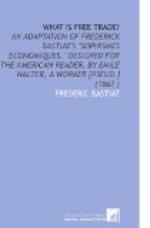“You have also said the producer and the consumer are one. If the manufacturer gains by protection, he will cause the agriculturist to gain also; if agriculture prospers, it opens a market for manufactured goods. Thus we, if you confer upon us the monopoly of furnishing light during the day, will as a first consequence buy large quantities of tallow, coal, oil, resin, kerosene, wax, alcohol, silver, iron, bronze, crystal, for the supply of our business; and then we and our numerous contractors having become rich, our consumption will be great, and will become a means of contributing to the comfort and competency of the workers in every branch of national labor.
“Will you say that the light of the sun is a gratuitous gift, and that to repulse gratuitous gifts is to repulse riches under pretence of encouraging the means of obtaining them?
“Take care—you carry the death-blow to your own policy. Remember that hitherto you have always repulsed foreign produce, because it was an approach to a gratuitous gift, and the more in proportion as this approach was more close. You have, in obeying the wishes of other monopolists, acted only from a half-motive; to grant our petition there is a much fuller inducement. To repulse us, precisely for the reason that our case is a more complete one than any which have preceded it, would be to lay down the following equation: + x + = -; in other words, it would be to accumulate absurdity upon absurdity.
“Labor and Nature concur in different proportions, according to country and climate, in every article of production. The portion of Nature is always gratuitous; that of labor alone regulates the price.
“If a Lisbon orange can be sold at one hundredth the price of a New York one, it is because a natural and gratuitous heat does for the one, what the other only obtains from an artificial and consequently expensive one.
“When, therefore, we purchase a Portuguese orange, we may say that we obtain it 99/100 gratuitously and 1/100 by the right of labor; in other words, at a mere song compared to those of New York.
“Now it is precisely on account of this 99/100 gratuity (excuse the phrase) that you argue in favor of exclusion. How, you say, could national labor sustain the competition of foreign labor, when the first has every thing to do, and the last is rid of nearly all the trouble, the sun taking the rest of the business upon himself? If then the 99/100 gratuity can determine you to check competition, on what principle can the entire gratuity be alleged as a reason for admitting it? You are no logicians if, refusing the 99/100 gratuity as hurtful to human labor, you do not a fortiori, and with double zeal, reject the full gratuity.




